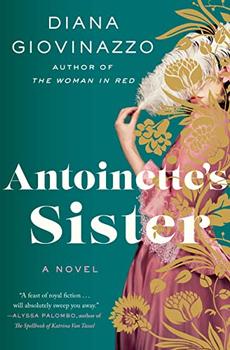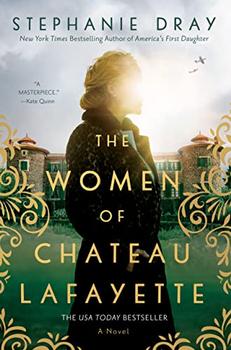Summary | Excerpt | Reading Guide | Reviews | Beyond the book | Read-Alikes | Genres & Themes | Author Bio

A Novel of the French Revolution
by Michelle MoranI've read Michelle Moran's previous novels and have liked them reasonably well. I've thought her writing and research were good, but not great; there has generally been something about each one that I thought could have been better. However Madame Tussaud is in a league of its own. It is near perfect - historical fiction at its finest - and by far her best novel.
The book's full title is Madame Tussaud: A Novel of the French Revolution, and that's an important clue to its subject. While we do find out a bit about Marie Grosholtz's life (she doesn't become Madame Tussaud until the book's epilogue), she's not the book's focus. This is a novel about the French Revolution, not about the rise of the creator of a famous museum. Marie is a witness; her first-person account of life before and during the Revolution provides a glimpse into the opulence of the dying regime as well as the growing chaos of life in Paris as that regime collapsed and is conveyed through the eyes of a woman who truly did mix in both worlds.
Moran's use of Marie Grosholtz as her heroine is an inspired choice. The real-life Grosholtz did tutor Louis XVI's sister, visit Versailles, and meet the king and his wife Marie Antoinette. She also hosted revolutionary luminaries such as Maximilien Robespierre in her salon. Had this character been Moran's creation I would have said these relationships were overly contrived - that it's unlikely any individual would know so many famous people - yet history bears out the accuracy of the associations. Indeed, the book is meticulously researched. I found myself repeatedly stopping to look up events that the author says occurred, and in each case I found she was relaying historical fact.
The author's attention to detail is pitch-perfect as she describes everything from the sumptuousness of the palaces to the squalor of La Force, the prison in which Grosholtz was held. I was particularly appreciative of her attention to the changing clothing styles during this time period, as they were important to the political climate (clothing was used to demonstrate loyalty to one faction or another), and it also helped me more fully visualize the scenes being described. The inclusion of snippets of historical trivia heightened my interest in the story as well.
Also very strong is the novel's pace. Like modern events, the French Revolution didn't happen overnight but was instead a slowly-building sequence of events. The story starts out leisurely as everyday life is portrayed, but it gradually picks up momentum, and the author realistically conveys the snowballing panic and anarchy as each new event escalates the paranoia sweeping Paris and the surrounding countryside.
Moran's only flaw is her weakness in creating three-dimensional characters. Minor characters in particular lack depth, but even those central to the plot come across as flat and emotionally distant. Every other aspect of the book was so well done though, that the limitation mattered very little to my overall enjoyment of the novel.
In short, Madame Tussaud is extraordinarily well-done historical fiction, likely to win Moran legions of new fans. It's highly recommended, particularly for those who enjoy the genre and anyone with even a minor interest in the French Revolution.
![]() This review was originally published in The BookBrowse Review in May 2011, and has been updated for the
January 2012 edition.
Click here to go to this issue.
This review was originally published in The BookBrowse Review in May 2011, and has been updated for the
January 2012 edition.
Click here to go to this issue.

If you liked Madame Tussaud, try these:

by Diana Giovinazzo
Published 2022
As Marie Antoinette took her last breath as Queen of France in Paris, another formidable monarch - Antoinette's dearly beloved sister, Charlotte - was hundreds of miles away, in Naples, fighting desperately to secure her release from the revolutionaries who would take her life. Little did Charlotte know, however, that her sister's execution would ...

The Women of Chateau Lafayette
by Stephanie Dray
Published 2022
An epic saga from New York Times bestselling author Stephanie Dray based on the true story of an extraordinary castle in the heart of France and the remarkable women bound by its legacy.
Your guide toexceptional books
BookBrowse seeks out and recommends the best in contemporary fiction and nonfiction—books that not only engage and entertain but also deepen our understanding of ourselves and the world around us.